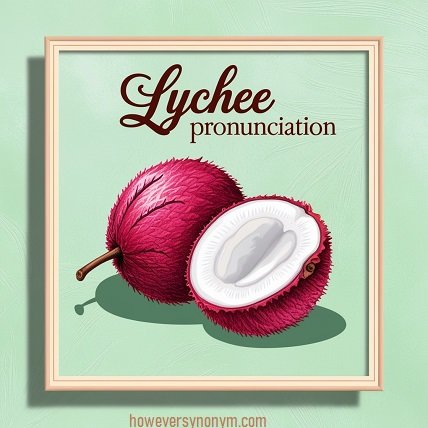What is Lychee?
The tropical fruit lychee, or Litchi chinensis as it is scientifically known, is native to southern China and is currently grown across Asia and beyond. The lychee pronunciation, with its characteristic red, rough skin and clear white flesh, is prized for its peculiar floral scent and sweetness. Although the fruit is usually consumed raw, it is also available dried, in juices, and in desserts, making it a flexible component in a wide range of cooking methods. Fruit enthusiasts all around the world adore it for its delicious flavor and smooth texture.
The Significance of Correct Speech
lychee pronunciation accuracy is essential for both clear communication and respect for cultural differences. Spelling a term incorrectly might cause misunderstandings and unintentionally insult someone, particularly when talking about culturally sensitive subjects. Accurately pronouncing the name of lychee makes it easier for you to participate in discussions about the fruit, whether you’re sharing stories, debating recipes, or learning about its culinary applications. It is a sign of respect for the language and culture the word comes from to pronounce it correctly.
The Essentials of Lychee Pronunciation
The way that “lychee” is pronounced in American and British English can vary significantly. While it is typically pronounced lie-chee in British English, it is commonly pronounced lee-chee in American English. This variance demonstrates the impact of linguistic trends and regional accents. Recognizing these variations not only makes it easier for you to pronounce the term correctly, but it also makes it easier for you to carry on discussions with those who may pronounce it differently.
Regional Disparities in Speech
Globally, as well as in American and British English, there are differences in how to pronounce lychee. For instance, the fruit is called lìzhī in Mandarin Chinese, highlighting the language’s tonal features. Local languages in Southeast Asia might add more variations, illustrating how the fruit has been incorporated into various culinary traditions. The fruit’s uniqueness is enhanced and its global appeal is shown by these regional pronunciations, which also highlight how language changes in response to cross-cultural communication.
The Lychee’s Etymology
The word lychee pronunciation comes from the Cantonese word lìzhī which means “gift for a joyous occasion.” This fruit’s etymology reflects its cultural significance in Chinese traditions, where it represents pleasure and prosperity. Lychee has always been connected to joyous occasions like marriages and family get-togethers. Gaining insight into the word’s etymology enhances your appreciation of the fruit by bringing to light its significance in a range of cultural customs and festivals.
The Importance of Lychee in Culture
lychee pronunciation is highly valued in Chinese culture and is frequently included in festivals and other festivities as a representation of happiness and good fortune. Due to its historical associations with romance and love, it is a popular option for special occasions like wedding feasts. Beyond its cultural origins, lychee is becoming more and more common in contemporary cuisine across the globe. Chefs use this unusual fruit to showcase its rich flavor profile and versatility in a range of dishes, from salads and desserts to drinks.
How to Choose and Keep Lychee
Selecting the ideal lychee pronunciation means seeking out fruits with a deep red color and a firm firmness. Although they should feel a little rough, fresh lychees shouldn’t be too soft or brown, as this would suggest overripeness. Lychee should be kept cold and dry, preferably in the refrigerator where it will keep for several days, to ensure maximum freshness. Lychee is delicious and can be frozen for use at a later time if you have an excess. This way, you can enjoy its flavor even when it’s not in season.
In summary
Being able to lychee pronunciation correctly is the first step toward enjoying the fruit’s many uses in cooking as well as its rich cultural history. Lychee, with its aromatic properties and sweet taste, is more than simply a tasty treat; it’s a symbol of global connections to flavors and customs 99-math.org. Whether you pronounce it more British or American, sharing this delicious tropical treat with loved ones broadens your gastronomic horizons and deepens your awareness of other cultures.
FAQs About Lychee Pronunciation and Usage
Do other languages have distinct pronunciations for “lychee”?
Yes, there can be substantial differences in pronunciation between languages. It is pronounced lìzhī in Mandarin Chinese, for instance.
Are lychee seeds edible?
No, lychee seeds are poisonous if consumed and are not edible. Before eating the flesh, the seed should always be removed.
What store sells fresh lychees?
During the peak season of the fruit, fresh lychee can be found in Asian grocery stores, farmers’ markets, and certain supermarkets.

